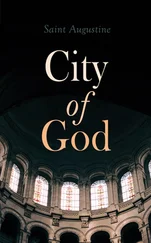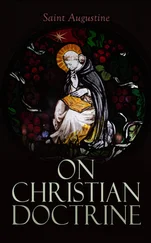These things I then knew not, nor observed; they struck my sight on all sides, and I saw them not. I indited verses, in which I might not place every foot every where, but differently in different metres; nor even in any one metre the self-same foot in all places. Yet the art itself, by which I indited, had not different principles for these different cases, but comprised all in one. Still I saw not how that righteousness, which good and holy men obeyed, did far more excellently and sublimely contain in one all those things which God commanded, and in no part varied; although in varying times it prescribed not every thing at once, but apportioned and enjoined what was fit for each. And I in my blindness, censured the holy Fathers, not only wherein they made use of things present as God commanded and inspired them, but also wherein they were foretelling things to come, as God was revealing in them.
Can it at any time or place be unjust to love God with all his heart, with all his soul, and with all his mind; and his neighbour as himself? Therefore are those foul offences which be against nature, to be every where and at all times detested and punished; such as were those of the men of Sodom: which should all nations commit, they should all stand guilty of the same crime, by the law of God, which hath not so made men that they should so abuse one another. For even that intercourse which should be between God and us is violated, when that same nature, of which He is Author, is polluted by perversity of lust. But those actions which are offences against the customs of men, are to be avoided according to the customs severally prevailing; so that a thing agreed upon, and confirmed, by custom or law of any city or nation, may not be violated at the lawless pleasure of any, whether native or foreigner. For any part which harmoniseth not with its whole, is offensive. But when God commands a thing to be done, against the customs or compact of any people, though it were never by them done heretofore, it is to be done; and if intermitted, it is to be restored; and if never ordained, is now to be ordained. For lawful if it he for a king, in the state which he reigns over, to command that which no one before him, nor he himself heretofore, had commanded, and to obey him cannot be against the common weal of the state (nay, it were against it if he were not obeyed, for to obey princes is a general compact of human society); how much more unhesitatingly ought we to obey God, in all which He commands, the Ruler of all His creatures! For as among the powers in man's society, the greater authority is obeyed in preference to the lesser, so must God above all.
So in acts of violence, where there is a wish to hurt, whether by reproach or injury; and these either for revenge, as one enemy against another; or for some profit belonging to another, as the robber to the traveller; or to avoid some evil, as towards one who is feared; or through envy, as one less fortunate to one more so, or one well thriven in any thing, to him whose being on a par with himself he fears, or grieves at, or for the mere pleasure at another's pain, as spectators of gladiators, or deriders and mockers of others. These be the heads of iniquity which spring from the lust of the flesh, of the eye, or of rule, either singly, or two combined, or all together; and so do men live ill against the three, and seven, that psaltery of often strings, Thy Ten Commandments, O God, most high, and most sweet. But what foul offences can there be against Thee, who canst not be defiled? or what acts of violence against Thee, who canst not be harmed? But Thou avengest what men commit against themselves, seeing also when they sin against Thee, they do wickedly against their own souls, and iniquity gives itself the lie, by corrupting and perverting their nature, which Thou hast created and ordained, or by an immoderate use of things allowed, or in burning in things unallowed, to that use which is against nature; or are found guilty, raging with heart and tongue against Thee, kicking against the pricks; or when, bursting the pale of human society, they boldly joy in self-willed combinations or divisions, according as they have any object to gain or subject of offence. And these things are done when Thou art forsaken, O Fountain of Life, who art the only and true Creator and Governor of the Universe, and by a self-willed pride, any one false thing is selected therefrom and loved. So then by a humble devoutness we return to Thee; and Thou cleansest us from our evil habits, and art merciful to their sins who confess, and hearest the groaning of the prisoner, and loosest us from the chains which we made for ourselves, if we lift not up against Thee the horns of an unreal liberty, suffering the loss of all, through covetousness of more, by loving more our own private good than Thee, the Good of all.
Amidst these offences of foulness and violence, and so many iniquities, are sins of men, who are on the whole making proficiency; which by those that judge rightly, are, after the rule of perfection, discommended, yet the persons commended, upon hope of future fruit, as in the green blade of growing corn. And there are some, resembling offences of foulness or violence, which yet are no sins; because they offend neither Thee, our Lord God, nor human society; when, namely, things fitting for a given period are obtained for the service of life, and we know not whether out of a lust of having; or when things are, for the sake of correction, by constituted authority punished, and we know not whether out of a lust of hurting. Many an action then which in men's sight is disapproved, is by Thy testimony approved; and many, by men praised, are (Thou being witness) condemned: because the show of the action, and the mind of the doer, and the unknown exigency of the period, severally vary. But when Thou on a sudden commandest an unwonted and unthought of thing, yea, although Thou hast sometime forbidden it, and still for the time hidest the reason of Thy command, and it be against the ordinance of some society of men, who doubts but it is to be done, seeing that society of men is just which serves Thee? But blessed are they who know Thy commands! For all things were done by Thy servants; either to show forth something needful for the present, or to foreshow things to come.
These things I being ignorant of, scoffed at those Thy holy servants and prophets. And what gained I by scoffing at them, but to be scoffed at by Thee, being insensibly and step by step drawn on to those follies, as to believe that a fig-tree wept when it was plucked, and the tree, its mother, shed milky tears? Which fig notwithstanding (plucked by some other's, not his own, guilt) had some Manichaean saint eaten, and mingled with his bowels, he should breathe out of it angels, yea, there shall burst forth particles of divinity, at every moan or groan in his prayer, which particles of the most high and true God had remained bound in that fig, unless they had been set at liberty by the teeth or belly of some "Elect" saint! And I, miserable, believed that more mercy was to be shown to the fruits of the earth than men, for whom they were created. For if any one an hungered, not a Manichaean, should ask for any, that morsel would seem as it were condemned to capital punishment, which should be given him.
And Thou sentest Thine hand from above, and drewest my soul out of that profound darkness, my mother, Thy faithful one, weeping to Thee for me, more than mothers weep the bodily deaths of their children. For she, by that faith and spirit which she had from Thee, discerned the death wherein I lay, and Thou heardest her, O Lord; Thou heardest her, and despisedst not her tears, when streaming down, they watered the ground under her eyes in every place where she prayed; yea Thou heardest her. For whence was that dream whereby Thou comfortedst her; so that she allowed me to live with her, and to eat at the same table in the house, which she had begun to shrink from, abhorring and detesting the blasphemies of my error? For she saw herself standing on a certain wooden rule, and a shining youth coming towards her, cheerful and smiling upon her, herself grieving, and overwhelmed with grief. But he having (in order to instruct, as is their wont not to be instructed) enquired of her the causes of her grief and daily tears, and she answering that she was bewailing my perdition, he bade her rest contented, and told her to look and observe, "That where she was, there was I also." And when she looked, she saw me standing by her in the same rule. Whence was this, but that Thine ears were towards her heart? O Thou Good omnipotent, who so carest for every one of us, as if Thou caredst for him only; and so for all, as if they were but one!
Читать дальше












